
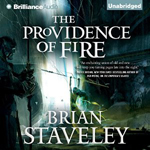 The Providence of Fire (Chronicle of the Unhewn Throne #2)
The Providence of Fire (Chronicle of the Unhewn Throne #2)
By Brian Staveley; Narrated by Simon Vance
Publisher: Brilliance Audio
Publication Date: 13 January 2015
[UNABRIDGED] – 23 hours, 37 minutes
Themes: / fantasy / brothers / monks / assassins / barbarian hordes /
Publisher summary:
Brian Staveley’s The Providence of Fire, the second novel in the Chronicle of the Unhewn Throne, a gripping new epic fantasy series in the tradition of Brandon Sanderson and George R. R. Martin The conspiracy to destroy the ruling family of the Annurian Empire is far from over. Having learned the identity of her father’s assassin, Adare flees the Dawn Palace in search of allies to challenge the coup against her family. Few trust her, but when she is believed to be touched by Intarra, patron goddess of the empire, the people rally to help her retake the capital city. As armies prepare to clash, the threat of invasion from barbarian hordes compels the rival forces to unite against their common enemy. Unknown to Adare, her brother Valyn, renegade member of the empire’s most elite fighting force, has allied with the invading nomads. The terrible choices each of them has made may make war between them inevitable. Between Valyn and Adare is their brother Kaden, rightful heir to the Unhewn Throne, who has infiltrated the Annurian capital with the help of two strange companions. The knowledge they possess of the secret history that shapes these events could save Annur or destroy it.
I gave this book the same rating as The Emperor’s Blades, and I think in many ways it’s better. But I also had higher expectations coming in. I had none for the first book, and found myself pleasantly surprised. So I was looking forward to this.
This book started off slow. With how the last one ended, I guess I was sort of expecting the book to hit the ground running. The last book is largely the “magic school” trope, although there isn’t a whole lot of magic. But there is rigorous training and rivalries and the like. And some of the characters can do magic.
Maybe my love of that trope, or the fact that they were “in training” made me less aware of just how STUPID The Emperor’s kids are. There was no hiding that here. I’m not a big fan of the super smart, super capable protagonist who can’t seem to do any wrong, but I hate the “I’m going to pull a plan out of my ass and somehow things will work out mostly right in the end” protagonist even worse. It would d be bad enough if only one of them did, but all three of them did, and continued to do it. They didn’t learn from their mistakes. They didn’t really seem to grow as characters. They just kept being idiots. And selfish. It got pretty frustrating.
So why did I give this 4 stars? Well two reasons mainly. One the story is interesting. The world building Mr. Staveley does in this book is especially intriguing. The pieces he put in place in this novel look to make for a really interesting third (and final?) book in this series.
Secondly he has some great supporting characters. Some are returning from the first novel, and some are new. In particular I really enjoyed the POV chapters from a former supporting character who was given a chance to shine. They were easily my favorite chapters in the book. I only wish they had started sooner. Maybe even in the last book, but it wouldn’t have made too much sense, so I understand the reasoning.
Overall this book is better, but with higher expectations, I found myself a bit disappointed at the same time. But I’m looking forward to the next book. I think for a middle book there is a lot to like. Hopefully the Emperor’s kids will get a clue by then.
As a narrator, Simon Vance is excellent as always. He was one of the main reasons I decided to try out The Emperor’s Blades. His performance is such that this series remains a must audio for me, even if it means waiting a bit longer to get my hands on the next book.
Review by Rob Zak.
 The Beast of Calatrava: A Foreworld SideQuest
The Beast of Calatrava: A Foreworld SideQuest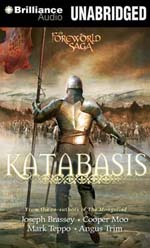 Katabasis (Mongoliad Cycle #4)
Katabasis (Mongoliad Cycle #4)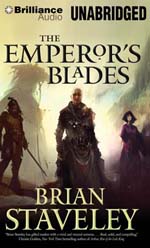 The Emperor’s Blades (Chronicle of the Unhewn Throne #1)
The Emperor’s Blades (Chronicle of the Unhewn Throne #1)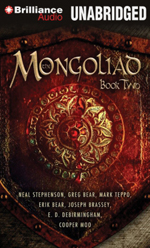 The Mongoliad Book Two
The Mongoliad Book Two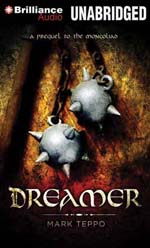 Dreamer: A Prequel to the Mongoliad (Foreworld Saga)
Dreamer: A Prequel to the Mongoliad (Foreworld Saga)